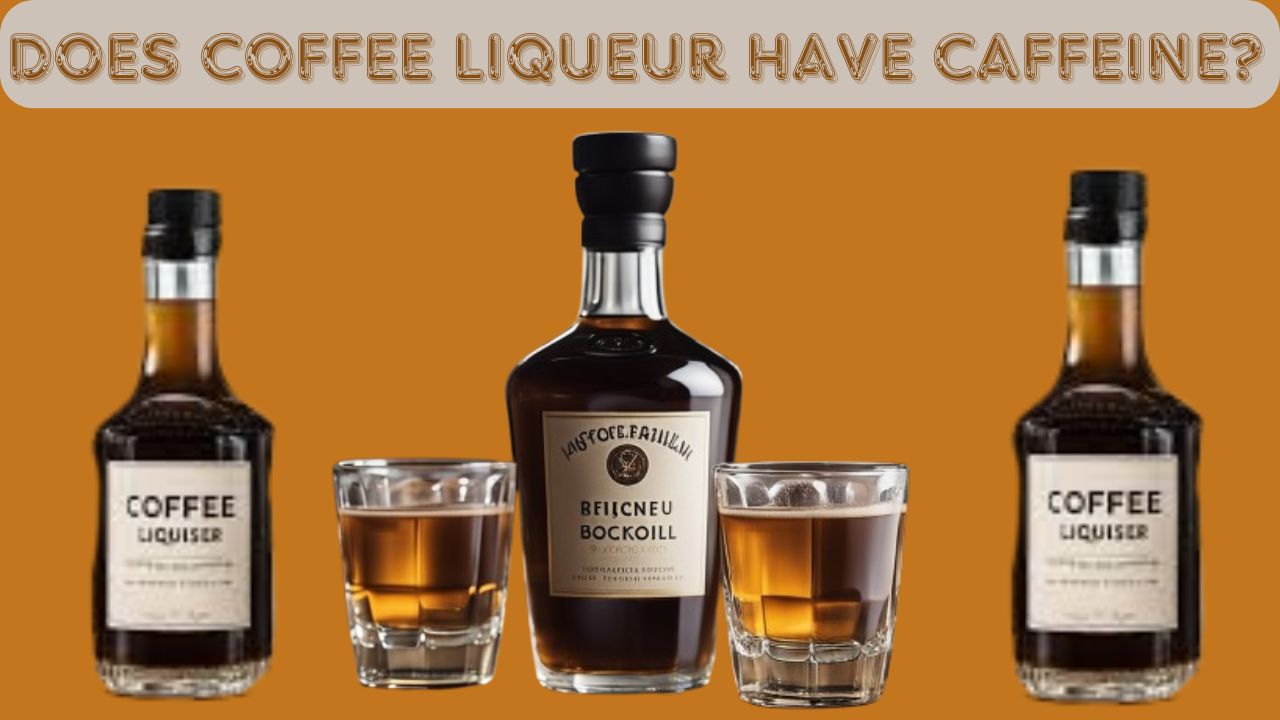Written By: Sherry Harris
Coffee liqueur, a popular ingredient in many cocktails and desserts, combines the rich flavors of coffee with the warmth of alcohol. But if you’re sensitive to caffeine or just curious, you might wonder: Does coffee liqueur have caffeine? In this article, we’ll dive deep into the world of coffee liqueurs to answer this question and more.
Table of Contents
What is Coffee Liqueur?
Coffee liqueur is a type of alcoholic beverage that blends the flavors of coffee with a sweetened base of distilled spirits. It’s often enjoyed on its own, mixed into cocktails, or used as a dessert flavor. Some of the most famous coffee liqueurs include Kahlúa and Tia Maria, but there are many varieties available, each with its own unique taste and composition.
Understanding Caffeine in Coffee
Caffeine is a natural stimulant found in coffee beans, tea leaves, and some other plants. It’s the compound that gives coffee its energy-boosting properties, helping to improve focus and alertness. The amount of caffeine in coffee can vary based on the type of coffee bean, the brewing method, and the serving size.
Does Coffee Liqueur Have Caffeine?
Does coffee liqueur have caffeine? Since coffee liqueur is made with coffee, it naturally contains some level of caffeine. However, the amount of caffeine can vary widely depending on the brand and recipe. Some coffee liqueurs have higher caffeine content due to the use of strong coffee or concentrated extracts, while others might have minimal caffeine, especially if made with decaffeinated coffee.
Ingredients in Coffee Liqueur
Coffee liqueur is typically made from a few key ingredients:
- Base Alcohol: The foundation of coffee liqueur is usually a distilled spirit like rum, vodka, or brandy.
- Coffee Extract or Flavoring: The coffee flavor comes from brewed coffee, coffee extract, or artificial coffee flavoring.
- Sweeteners and Other Flavorings: To balance the bitterness of coffee, sweeteners like sugar or syrup are added, along with other flavorings such as vanilla, caramel, or chocolate.
Coffee Liqueur Nutritional Information
When enjoying coffee liqueur, it’s important to understand its nutritional content, which varies depending on the brand and recipe. Here’s a breakdown of the typical nutritional information for coffee liqueur:
| Nutrient | Amount per Serving (1.5 oz or 44 ml) |
|---|---|
| Calories | 91 |
| Total Fat | 0g |
| Sodium | 0mg |
| Total Carbohydrates | 11g |
| Sugars | 10g |
| Protein | 0g |
| Alcohol Content | 7g (20% ABV) |
| Caffeine | 4-6mg |
Nutrition Facts: Coffee liqueur is relatively high in calories due to its sugar content, with around 91 calories per 1.5 oz serving. It contains no fat, sodium, or protein, making carbohydrates the primary source of its calorie content. The alcohol content is moderate, with an average of 20% alcohol by volume (ABV).
Amount per Serving: Each serving of coffee liqueur provides approximately 11 g of total carbohydrates, of which 10 g are sugars. While present, caffeine content is minimal compared to regular coffee, ranging between 4-6mg per serving.
Do You Know?
👉 Does La Croix Have Caffeine?
Popular Coffee Liqueur Brands and Their Caffeine Content
Let’s take a look at some well-known coffee liqueur brands and their typical caffeine content:
- Kahlúa: Kahlúa is one of the most popular coffee liqueurs and contains about 100 mg of caffeine per liter. This means a standard serving (1.5 oz or 44 ml) contains around 4.4 mg of caffeine.
- Tia Maria: Another famous coffee liqueur, Tia Maria, has slightly more caffeine, with approximately 130 mg per liter. A standard serving would have about 5.7 mg of caffeine.
- Other Brands: Various other brands may have different caffeine levels, so it’s essential to check the label or contact the manufacturer for precise information.
Comparing Caffeine Content in Coffee Liqueur vs. Regular Coffee
For comparison, a typical 8-ounce cup of brewed coffee contains about 95 mg of caffeine, though this can range from 70 to 140 mg depending on the type of coffee and brewing method. In contrast, a standard serving of coffee liqueur has significantly less caffeine, often less than 10 mg per serving.
Factors That Influence Caffeine Levels in Coffee Liqueur
Several factors can influence the caffeine content in coffee liqueur, including:
- Type of Coffee Used: Some coffee beans naturally contain more caffeine than others.
- Amount of Coffee Extract: The concentration of coffee extract or brewed coffee used in the liqueur can raise or lower the caffeine content.
- Manufacturing Process: Different brands have unique processes for making coffee liqueur, which can also impact the final caffeine levels.
How Caffeine in Coffee Liqueur Affects the Body
Caffeine from coffee liqueur is metabolized in the same way as caffeine from other sources. It can increase alertness, enhance focus, and even improve mood in moderate amounts. However, the relatively low caffeine content in coffee liqueur means it’s unlikely to cause significant effects unless consumed in large quantities.
Is Coffee Liqueur Safe to Drink for Caffeine-Sensitive Individuals?
If you’re sensitive to caffeine, you may want to be cautious with coffee liqueur. While it contains less caffeine than regular coffee, even small amounts can cause issues for some people. However, many brands offer decaffeinated options, or you can look for liqueurs made with minimal coffee content.
How to Enjoy Coffee Liqueur Responsibly
Coffee liqueur is best enjoyed in moderation. Here are some tips for responsible consumption:
- Serving Suggestions: Sip it neat, over ice, or as part of a cocktail like a White Russian or Espresso Martini.
- Pairing with Desserts: Coffee liqueur pairs well with chocolate-based desserts, vanilla ice cream, or tiramisu.
Common Myths About Coffee Liqueur and Caffeine
There are several misconceptions about coffee liqueur and caffeine:
- Myth 1: “Coffee liqueur is as strong as a cup of coffee.” Fact: The caffeine content in coffee liqueur is much lower than in a cup of coffee.
- Myth 2: “All coffee liqueurs are caffeinated.” Fact: Some coffee liqueurs are made with decaffeinated coffee or have negligible caffeine content.
- Myth 3: “Coffee liqueur keeps you awake at night.” Fact: The small amount of caffeine in coffee liqueur is unlikely to interfere with sleep, but it depends on individual sensitivity.
The Role of Coffee Liqueur in Cocktails
Coffee liqueur is a versatile ingredient in cocktails, adding depth and complexity to drinks:
- Popular Cocktails: White Russian, Black Russian, Espresso Martini, and Mudslide.
- Caffeine’s Impact: The caffeine in coffee liqueur can provide a subtle boost in energy, making these cocktails popular choices for evening events.
Alternatives to Coffee Liqueur
If you’re looking for non-caffeinated alternatives, consider these options:
- Non-Caffeinated Liqueurs: Vanilla liqueur, chocolate liqueur, or hazelnut liqueur can be used as substitutes.
- Homemade Coffee Liqueur: You can control the caffeine content by making your coffee liqueur at home using decaffeinated coffee.
If you’re looking for alternatives to coffee liqueur, several options vary in flavor, alcohol content, and caffeine levels. Below are some popular alternatives:
1. Chocolate Liqueur
Chocolate liqueur provides a rich and creamy flavor, perfect for those who enjoy sweet, dessert-like drinks. It typically contains no caffeine, making it a suitable choice for evening enjoyment.
2. Vanilla Liqueur
Vanilla liqueur offers a smooth, sweet flavor with hints of vanilla bean. Like chocolate liqueur, it’s usually caffeine-free, appealing to those who prefer a milder, non-caffeinated option.
3. Hazelnut Liqueur
Hazelnut liqueur delivers a nutty, aromatic flavor, often enjoyed in coffee-based cocktails. It generally contains no caffeine, making it a pleasant alternative to coffee liqueur.
4. Irish Cream Liqueur
Irish cream liqueur is a blend of cream, whiskey, and flavorings, with a smooth, rich texture. While it can contain trace amounts of caffeine from chocolate or coffee extracts, it’s usually negligible.
5. Amaretto
Amaretto is an almond-flavored liqueur with a sweet, nutty taste. It’s caffeine-free, often used in baking or mixed into cocktails for a unique flavor profile.
6. RumChata
RumChata is a cream liqueur made from rum, cream, cinnamon, and vanilla. It’s typically caffeine-free, offering a sweet and creamy alternative to coffee liqueur.
7. Frangelico
Frangelico is a hazelnut liqueur with a hint of vanilla and cocoa. It’s typically caffeine-free, making it a great option for those avoiding caffeine.
8. Bailey’s Almande
Bailey’s Almande is a dairy-free, almond-based version of Bailey’s Irish Cream. It’s caffeine-free and suitable for those who are lactose intolerant or vegan.
| Alternative | Caffeine Content (per serving) |
|---|---|
| Chocolate Liqueur | 0mg |
| Vanilla Liqueur | 0mg |
| Hazelnut Liqueur | 0mg |
| Irish Cream Liqueur | Trace (negligible) |
| Amaretto | 0mg |
| RumChata | 0mg |
| Frangelico | 0mg |
| Bailey’s Almande | 0mg |
Do You Know?
👉 Does Barley Tea Have Caffeine?
Recommended Daily Intake of Coffee Liqueur
When it comes to enjoying coffee liqueur, moderation is key. Due to its alcohol and sugar content, it’s advisable to consume it in limited amounts. The typical serving size is 1.5 oz, which is often sufficient to enjoy its rich flavor without overindulging.
For those concerned about caffeine or calorie intake, it’s important to remember that coffee liqueur, while lower in caffeine than regular coffee, still contains sugars and alcohol that can add up quickly. Consuming one or two servings per day is generally considered safe for most adults, but this can vary based on individual tolerance to alcohol and caffeine.
Conclusion
Does coffee liqueur have caffeine? Yes, but the amount is relatively low compared to regular coffee. Whether you’re enjoying it neat or in a cocktail, it’s essential to be aware of your caffeine sensitivity and enjoy it in moderation. With so many varieties available, you can find the perfect coffee liqueur to suit your taste and caffeine preferences.
FAQS
1. Does decaf coffee liqueur exist?
Yes, some brands offer decaf versions of coffee liqueur, or you can make your own at home using decaffeinated coffee.
2. How much caffeine is in a typical serving of coffee liqueur?
A standard serving of coffee liqueur contains around 4-6 mg of caffeine, depending on the brand and recipe.
3. Can you drink coffee liqueur at night?
Given its low caffeine content, most people can enjoy coffee liqueur at night without it affecting their sleep.
4. Is coffee liqueur suitable for non-coffee drinkers?
Yes, the coffee flavor in liqueur is often milder and sweeter, making it more palatable for those who don’t usually drink coffee.
5. What’s the difference between coffee liqueur and regular coffee?
Coffee liqueur is an alcoholic beverage with a sweet, coffee flavor, while regular coffee is a non-alcoholic drink made from brewed coffee beans.

